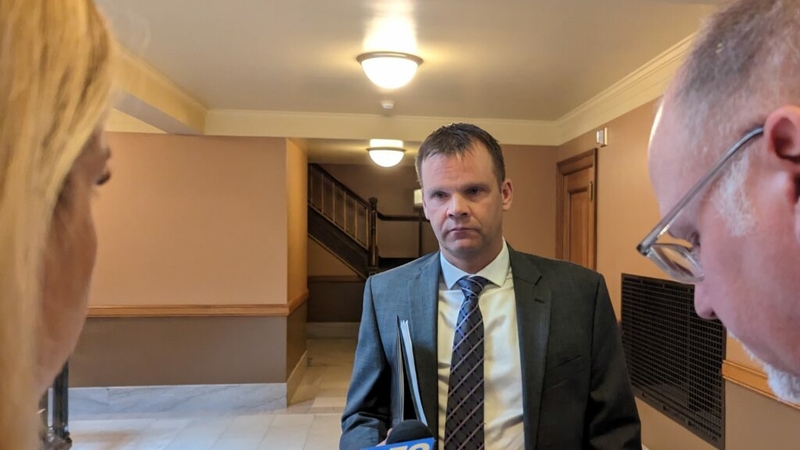Senate divided on shared revenue bill

Wisconsin’s state Senate is not taking up shared revenue during a Wednesday floor session as negotiations are ongoing and the Senate is divided — not along partisan lines — about whether to keep a provision that would require the city of Milwaukee to get voter approval on raising local sales taxes.
A bill to increase local government funding is being considered by Senate lawmakers after passing the Assembly a couple of weeks ago. The bill includes a requirement that Milwaukee and Milwaukee County get voter approval to adopt an additional 2% sales tax in the city and a 0.375% sales tax in the county, despite concerns from local officials that a referendum would fail. The sales tax would be used to help pay unfunded pension obligations.
Senate Majority Leader Devin LeMahieu (R-Oostburg) supports removing the referendum provision and instead allowing the local county board and city council the ability to enact the tax with a simple or two-thirds majority vote.
LeMahieu has previously said his caucus would likely remove it from the Senate version of the bill and that he thinks a referendum would fail, a position that puts him at odds with Wisconsin’s top Assembly Republican, Speaker Robin Vos. However, LeMahieu told WISN-12 that he doesn’t have the 17 votes to remove the provision that would require Milwaukee to get voter approval to enact an additional sales tax, though he said he is working on doing that.
“The challenge with having a referendum is we don’t have any fall elections this year, so it would be a standalone referendum just on people raising their own, going out to vote to raise taxes on themselves, which is sort of a tough thing to try to convince them to do,” LeMahieu said on WISN-12. “So I think the city council over the last couple decades has created the pension mess that they’re in and so I think it’s incumbent on them to vote to fix it themselves.”
Sen. Chris Kapenga (R-Delafield) and Sen. Steve Nass (R-Whitewater) have criticized the Milwaukee portion of the bills. Kapenga wrote about his support for keeping the Milwaukee referendum requirement, saying that it gives voters complete control of local government.
As he stakes out a different position, LeMahieu could look to Democrats to get the votes that the bill would need to pass.
“I am eternally grateful to Sen. LeMahieu for making sure that the referendum is still on the table for discussion,” Sen. LaTonya Johnson (D-Milwaukee) said during the Democrats’ pre-session press conference Wednesday. “I am hopeful that that will come out so that our local electeds will have the opportunity to take a vote on that.”
“I am hopeful that we can come up with a compromise,” said Senate Minority Leader Melissa Agard (D-Madison), adding that local elected officials in Milwaukee are afraid a referendum would fail. “This is something that affects all 72 counties and we should not be pitting the county of Milwaukee, a community that the whole state depneds on in order to be successful and prosperous, against everyone else.”
Democrats have not seen the details of the plan that Senate Republicans are working on, Agard added.
“We’re willing to work with the speaker and the governor and my caucus and all the stakeholders involved to make sure that we get a bill that we can garner votes that everyone can get behind and we can pass,” LeMahieu said on WISN-12. “Hopefully, it’s a bipartisan bill, I know there is interest with some Democrats in the Senate, who want to get there and vote for it and hopefully we can do that.”
Democratic Gov. Tony Evers has said that he agrees with LeMahieu on removing the requirement, however Assembly Speaker Robin Vos (R-Rochester) has said that would kill the bill.
However, Democrats also don’t seem aligned on the bill or whether to remove the referendum requirement.
Sen. Lena Taylor (D-Milwaukee) told WISN-12 on Wednesday that she would consider voting against the Senate version of the bill if it doesn’t include the referendum requirement.
“I definitely want the referendum. I think it is appropriate for the people to make the choice,” Taylor said. “The people have made the decision before.”
Local Milwaukee officials have sounded alarm bells about the potential that the city won’t be able to enact an additional local sales tax despite being on the brink of a financial crisis. Without the additional revenue, local officials might be looking at drastically cutting essential services to keep up with unfunded pension costs.








